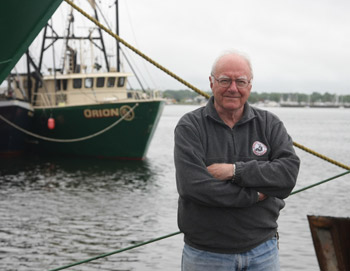Experimental Yellowtail Fishery Could Provide Much-Needed Data
by Laurie Schreiber

Dr. Brian Rothschild, SMAST, A considerable proportion of yellowtail stock will be under harvested, “and the entire groundfish fishery will be driven, unnecessarily further into the ground.” © Photo by Sam Murfitt
MYSTIC, Conn. – Brian Rothschild, president of the New Bedford, Mass., Center for Sustainable Fisheries, told the New England Fishery Management Council (NEFMC) that an experimental fishery for Georges Bank yellowtail flounder could provide much-needed data on the stock’s status.
The status of yellowtail is “shrouded in considerable uncertainty,” Rothschild said at NEFMC’s April meeting. “We believe an experimental cooperative research program will contribute to the data, thereby reducing uncertainties associated with current management advice.”
Georges Bank yellowtail is a mid-value fish often caught incidentally while fishermen target high value stocks like cod, haddock and scallops.
In 2012, assessment scientists discovered the condition of the stock remained poor, despite expectations of improvement due to strict management measures. That year, the overall U.S. allocation of the Georges Bank yellowtail stock was reduced by 61 percent. The allocation is divided between the scallop and groundfish fisheries. Yellowtail flounder is bycatch in the high-value scallop fishery. Under existing regulations, the allocation to the scallop fishery increased by 53 percent to account for bycatch. The allocation to the groundfish industry, however, was reduced by 80 percent.
In a March 11 letter to NEFMC, Rothschild urged NEFMC to implement an emergency action. Information from an experimental program could be used to increase the precision from the disputed yellowtail stock assessments, he wrote.
“The current assessment reckons the biomass is 800 metric tons,” he wrote. “But several studies reckon the population is around 4,000 metric tons. If the latter is correct, he wrote, then a considerable proportion of yellowtail stock will be underharvested, “and the entire groundfish fishery will be driven, unnecessarily further into the ground.” Furthermore, current bycatch limits in the scallop fishery may be “severely jeopardizing the future feasibility of the scallop industry’s ability to harvest scallops.”
Under the proposal, a larger percentage of yellowtail will be harvested by a limited number of boats. They would agree to more intensified observer coverage, logbook coverage and port sampling.
“We think that there is too much at stake” to delay, he wrote.
